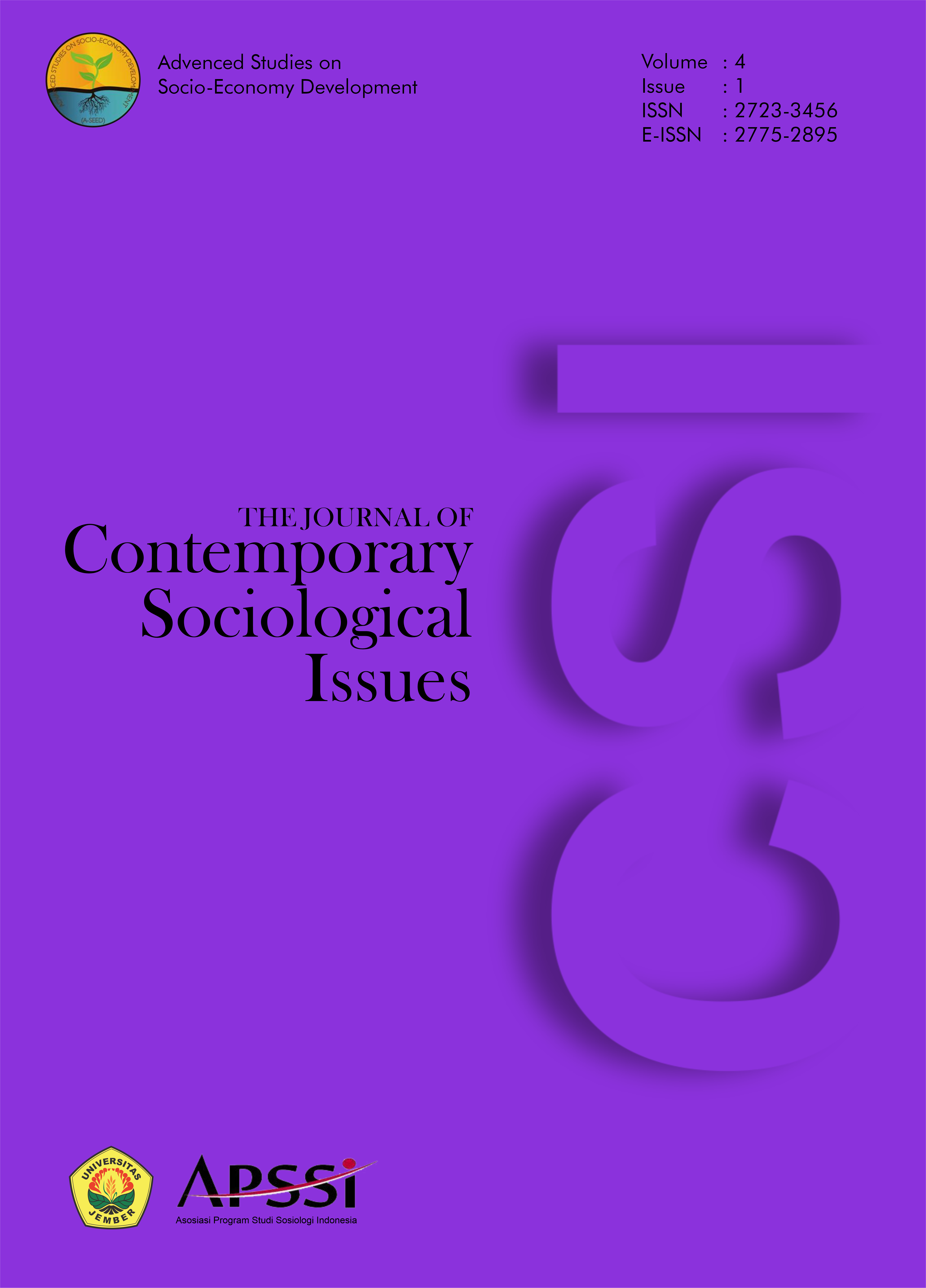The Transformation of Tourism Villages Through Social Capital and Leadership in Turi District, Sleman, Yogyakarta
DOI:
https://doi.org/10.19184/csi.v4i1.46608Abstract
This research investigates social shifts in Turi District, Sleman Regency, The Special Region of Yogyakarta. Turi District was previously known as a salak fruit-producing area, which developed as a salak agro center. However, Turi District has become the area with the most tourist villages in Sleman Regency. The growth of tourist villages there is relatively rapid and reasonably fast. This research aims to look at the transformation process and the capital supporting the tourist villages' development in the Turi District. The method used in this research is qualitative. The data collection techniques are observation and interviews. Meanwhile, the theories used are social capital and human capital. The research has three main findings. Firstly, the tourist village in Turi District is a shared asset managed collectively and driven by the collective awareness of the local community. Solid social relations and local institutions support this collective awareness. Social capital makes it easier to mobilize community participation in the pilot process and management of tourist villages. Second, the existence of solid bonding relationship capital supported by external network capital with outside institutions (bridging social capital). It further facilitates efforts to develop tourist villages. Third, even though social capital significantly influences the start-up and management of tourist villages, the key factor in intensifying the development of tourist villages comes from actors or leaders who can build ideas and mobilize physical capital and social capital. In other words, human capital is fundamental in developing tourist villages in Turi District. Based on these findings, this research provides an overview of village communities regarding the importance of commodifying village potential through independent management, actualizing social capital, and the significance of local leadership. It is to provide economic benefits for village communities and maintain environmental and cultural assets (environment and culture sustainability).
Keywords: human capital, leadership, social capital, tourism villages, transformation
Downloads
References
AELI. “Aeli Official Site,†2022. https://www.aeli.or.id/.
Aritenang, Adiwan. “The Role of Social Capital on Rural Enterprises Economic Performance: A Case Study in Indonesia Villages.†Accessed September 15, 2022. https://doi.org/10.1177/21582440211044178.
ARS. “Raih Juara Harapan II Kategori Berkembang Festival Desa Wisata 2019 – Desa Wisata Pulewulung,†2019. https://pulewulung.com/raih-juara-harapan-ii-kategori-berkembang-festival-desa-wisata-2019/.
Capello, R., and A. Faggian. “Collective Learning and Relational Capital in Local Innovation Processes.†Regional Studies 39, no. 1 (2005): 75–87. https://doi.org/10.1080/0034340052000320851.
Ciptosari, Fitri, Titi Susilowati Prabawa, and Antonius Bele. “Social Capital in Local Entrepreneurship, A Study of Community Involvement in Tourism in Delha, District. Rote Ndao, East Nusa Tenggara.†Jurnal Kawistara 9, no. 1 (May 1, 2019): 45–59.
Damsar and Indrayani. Introduction to Economic Sociology. 2nd Edition. Pranada Media, 2013.
Danang. Interview about History and Management of the Pulewulung Tourism Villages., Oktober 2021.
Dasgupta, Parta, and Ismail Serageldin. “Economic Growth and Social Capital in Italy.†In Social Capital: A Multifaceted Perspective. World Bank, 2000.
Desa Wisata Pulesari. “Tourism Village News Welcome to Pulesari Tourism Village.†Desa Wisata Pula, October 26, 2021. https://desawisatapulesari.wordpress.com/category/news-desa-wisata/.
Didi. Wawancara Sejarah dan Pengelolaan Desa Wisata Pulesari, Oktober 2023.
Eko. Interview about Tourism Village Management in Bangunkerto Turi, Oktober 2021.
Faisal, S. Social Research Formats. Jakarta: Raja Grafindo Persada, 2010.
Field, John. Social Capital. Translated by Nurhadi. 3rd ed. Yogyakarta: Discourse Creation, 2010.
Fitriana, Arum Indah Nur. “Tourism Village Development Strategy.†Thesis, Muhammadiyah University, 2017.
Fotovvat, Shabnam, karam Safari, Karamollah Zayyari, and Somayeh boostani. “A Study on Relationship between Social Capital and Sustainable Development.†Management Science Letters 4, no. 9 (2014): 2117–20. https://doi.org/10.5267/j.msl.2014.8.007.
Gidden, Anthony. In Introduction to Economic Sociology, edited by Damsar and Indrayani, 2nd Edition. Pranada Media, 2013.
Gumbau-Albert, M., and J. Maudos. “The Importance of Intangible Assets in Regional Economic Growth: A Growth Accounting Approach.†Annals of Regional Science, 2022. https://doi.org/10.1007/s00168-022-01138-6.
Halushka, Zoia, and Nafus Inna. “Networking as A Component of Forming Social Capital: The Economic Aspect.†International Journal of Innovative Technologies in Social Science 7, no. 28 (2020): 411657.
Hasbullah, Jousairi. Social Capital (Towards Excellence in Indonesian Human Culture). Jakarta: MR-United Press, 2006.
Helliwell, John F., and Robert D. Putnam. “Economic Growth and Social Capital in Italy.†In Social Capital: A Multifaceted Perspective, edited by Parta Dasgupta and Ismail Serageldin. World Bank, 2000.
Idrus, Muhammad. Metode Penelitian Ilmu Sosial. Jakarta: Erlangga, 2009.
———. Social Science Research Methods. 2nd ed. Jakarta: Erlangga, 2009.
Irianto, Agus Maladi. “Commodification of Culture in The Global Economic Era on Local Wisdom: Case Study of The Existence of The Tourism and Traditional Arts Industry In Central Java.†Journal Theology 27, no. 1 (2016).
Istriyani, Ratna. “Consuming Leisure Time.†Journal of Contemporary Sociological Issues 1, no. 1 (February 3, 2021): 17–34. https://doi.org/10.19184/csi.v1i1.19803.
Kasali, Rhenald. The Great Shifting. Jakarta: PT. Gramedia Pustaka Utama, 2018.
Kemenparekraf. “Desa Wisata Terus Tumbuh Sebagai Pariwisata Alternatif.†Kemenparekraf, February 26, 2021. https://www.kemenparekraf.id.
Kemenparekraf/Baparekraf RI. “Membangun Ekosistem Desa Wisata Bersama Komunitas.†Accessed March 6, 2024. https://www.kemenparekraf.go.id/ragam-pariwisata/Membangun-Ekosistem-Desa-Wisata-Bersama-Komunitas.
Krishna, Anirudh. Active Social Capital: Tracing the Roots of Development and Democracy. Columbia University Press, 2002.
Leavy (ed), Patricia. The Oxford Handbook of Qualitative Research. United States of America: Oxford University Press, 2014.
Lidya, Febby, Sarwititi Sarwoprasodjo, and Musa Hubeis. “Transformational Style of Leader in Community-Based Tourism (Study Case on Ranggon Hills Group, Gunung Sari Village).†Sodality: Journal of Rural Sociology 8, no. 3 (2020): 131–51.
Lin, Nan. Social Capital: A Theory of Social Structure and Action. Cambridge University Press, 2004.
Moscardo, Gianna. Building Community Capacity for Tourism Development. CABI, 2008.
Mulyadi, Mohammad. Partisipasi Masyarakat Dalam Pembangunan Masyarakat Desa. Nadi Pustaka, 2009.
Neuman, W. Lawrence. Social Research Methods: Qualitative and Quantitative Approaches. Pearson Australia Pty Limited, 2013.
Newman, M. E. J. “The Structure and Function of Complex Networks.†SIAM Review 45, no. 2 (January 2003): 167–256.
Nurhadi, Iwan, Titik Sumarti, Arya Hadi Dharmawan, and Didin S. Damanhuri. “Cultural Commodification and Ethical Transition of Tourism Development: A Case in Osing Community, Indonesia.†Sodality: Jurnal Sosiologi Pedesaan 10, no. 1 (March 2, 2022): 24–43. https://doi.org/10.22500/10202238564.
Pradana, Mahatva Yoga Adi, and Ratna Istriyani. “Agreements: Social and Political Capital of the Kalitekuk Community in Creating a Tourism Village.†Jurnal Ilmiah Ilmu Sosial 6, no. 2 (December 6, 2020): 138.
Pratiwi, Magvira Ardhia, and Respati Wikantiyoso. “Local Wisdom as Cultural Resilience on Tourism Activities (Case Study: Penglipuran Bali Traditional Village).†Local Wisdom: Scientific Journal of Local Wisdom Studies 14, no. 1 (January 15, 2022): 95–105.
Priyadi, Unggul. “The Role of Pondoh Salak Farming Business on the Regional Economy in Dati II Sleman Regency (Case Study in Turi District).†Economic Journal of Emerging Markets 2, no. 1 (1997): 71–79.
Purnomo, S. “Sleman Regent Decree No. 32.5/Kep.KDH/A/2020 Concerning Sleman Regency Tourism Villages in 2020,†2020.
Rachmad. Interview about Transformation and Management of Tourism Villages in Turi District, Oktober 2021.
Raharjo. Introduction to Rural and Agricultural Sociology. Gadjah Mada University Press, 2017.
Siahaan, Hotman M. Introduction to the History and Theory of Sociology. Jakarta: Erlangga, 1986.
Srirejeki, Kiki, Agus Faturahma, Warsidi Warsidi, Permata Ulfah, and Eliada Herwiyanti. “Pemetaan Potensi Desa Untuk Penguatan Badan Usaha Milik Desa Dengan Pendekatan Asset Based Community-Driven Development | Srirejeki | Warta LPM,†2020. https://journals.ums.ac.id/index.php/warta/article/view/8974/5259.
Tim Klasifikasi Desa Wisata Kabupaten Turi. “Laporan Akhir Kajian Klasifikasi Desa Wisata Kabupaten Sleman Tahun 2020.†Yogyakarta: Dinas Pariwisata Kabupaten Sleman, 2020.
Utami, Bekti Nur, and Dwi Khonitan. “Community Empowerment Based on ‘Social Entrepreneurship’ in the Field of Agriculture and Livestock: Case Study of Bukit Langkap Village, Lingga Regency, Riau Islands.†Journal of Sociological Thought 5, no. 2 (April 1, 2019): 126–47.
Wu, B., L. Liu, and C.J. Carter. “Bridging Social Capital as a Resource for Rural Revitalisation in China? A Survey of Community Connection of University Students with Home Villages.†Journal of Rural Studies 93 (2022): 254–62. https://doi.org/10.1016/j.jrurstud.2019.05.008.
Zunariyah, Siti, Akhmad Ramdhon, and Argyo Demartoto. “TAHAP PEMBERDAYAAN KAMPUNG WISATA BERBASIS POTENSI DAN KEARIFAN LOKAL.†Jurnal Analisa Sosiologi 10, no. 1 (April 30, 2021). https://doi.org/10.20961/jas.v10i1.50331.
Downloads
Published
Issue
Section
License
Copyright (c) 2024 Ratna Istriyani

This work is licensed under a Creative Commons Attribution-NonCommercial-ShareAlike 4.0 International License.








